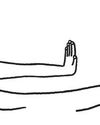
One evening in November, 2021, a group of men assembled at sundown on the terrace of the Ruckomechi Camp, a safari resort on the Zambezi River. Since arriving by private plane, they had gone out lionspotting, boated down the river, and landed a giant tiger fish; now they were clinking gin-and-tonics. Hippos wallowed in the water below.
The party was led by Renat Heuberger, a forty-four-year-old Swiss entrepreneur with narrow eyes and a cropped copper beard. Heuberger was the chief executive of South Pole, the world’s largest carbon-offsetting firm, and he had come to Zimbabwe to fight off an urgent threat to his company.
A decade earlier, South Pole had signed a deal to sell carbon offsets from an effort to protect a vast swath of forest on the banks of Lake Kariba, upriver from the camp. The Kariba project, spanning an area ten times the size of New York City, was among the world’s first “avoided deforestation” programs; by deterring local people from chopping down trees, it promised to prevent the release of tens of millions of tons of greenhouse gas. Leading corporations, including Volkswagen, Gucci, Nestlé, Porsche, and Delta Air Lines, paid South Pole nearly a hundred million dollars for Kariba credits, allowing them to market goods or services as “carbon neutral.”
South Pole thus pioneered a model of carbon offsetting that has been counted among our best hopes for staving off climate catastrophe: a mechanism that diverts funds from polluters in wealthy countries to protect crucial ecosystems in the Global South. Heuberger, a kinetic, grandiloquent man, speaks expansively about his mission. “We’re here to save the climate,” he told me.
هذه القصة مأخوذة من طبعة October 23, 2023 من The New Yorker.
ابدأ النسخة التجريبية المجانية من Magzter GOLD لمدة 7 أيام للوصول إلى آلاف القصص المتميزة المنسقة وأكثر من 9,000 مجلة وصحيفة.
بالفعل مشترك ? تسجيل الدخول
هذه القصة مأخوذة من طبعة October 23, 2023 من The New Yorker.
ابدأ النسخة التجريبية المجانية من Magzter GOLD لمدة 7 أيام للوصول إلى آلاف القصص المتميزة المنسقة وأكثر من 9,000 مجلة وصحيفة.
بالفعل مشترك? تسجيل الدخول

BADDIE ISSUES
\"Wicked\" and \"Gladiator II.\"

LET'S MAKE A DEAL
\"Death Becomes Her\" and \"Burnout Paradise.\"

ANTI HEROES
\"The Franchise,\" on HBO.

FELLOW-TRAVELLERS
The surprisingly sunny origins of the Frankfurt School.

NOW YOU SEE ME
John Singer Sargent's strange, slippery portraits of an art dealer's family.

PARIS FRIEND - SHUANG XUETAO
Xiaoguo had a terror of thirst, so he kept a glass of water on the table beside his hospital bed. As soon as it was empty, he asked me to refill it. I wanted to warn him that this was unhealthy - guzzling water all night long puts pressure on the kidneys, and pissing that much couldn't be good for his injury. He was tall, though, so I decided his insides could probably cope.

WILD SIDE
Is Lake Tahoe's bear boom getting out of hand?

GETTING A GRIP
Robots learn to use their hands.

WITHHOLDING SEX FROM MY WIFE
In the wake of [the] election, progressive women, who are outraged over Donald Trump's victory at the ballot box, have taken to social media with public, vengeful vows of chastity. - The Free Press.

DEADLINE EXTENSION
Old age, reborn.